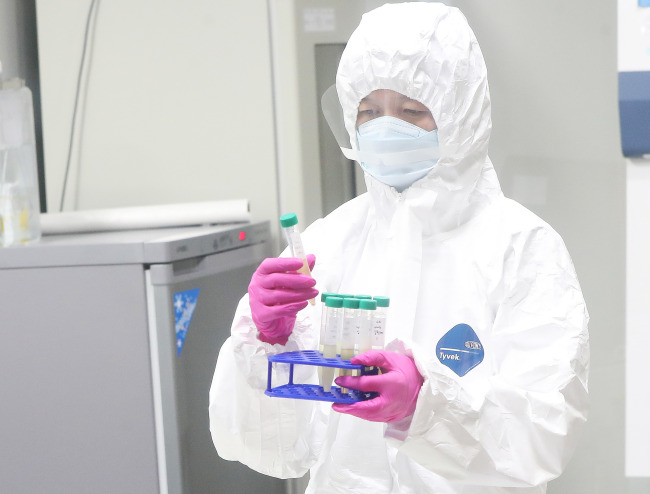Health authorities said Saturday they had confirmed that two cats found dead in Pocheon, Gyeonggi Province, tested positive for a highly pathogenic bird flu virus that has wiped out nearly 16 percent of the country’s chicken population since November.
The reports of the cats’ possible infection were made on Dec. 25-26. The test marked South Korea’s first infection of avian influenza in mammals since February 2015, according to the Agriculture Ministry.
The cats were found some 2 kilometers from a chicken farm where the H5N6 avian influenza was reported late November. They are believed to have had eaten birds contaminated with the virus. More than 1.7 million chickens have been culled in the town alone.
The reports of the cats’ possible infection were made on Dec. 25-26. The test marked South Korea’s first infection of avian influenza in mammals since February 2015, according to the Agriculture Ministry.
The cats were found some 2 kilometers from a chicken farm where the H5N6 avian influenza was reported late November. They are believed to have had eaten birds contaminated with the virus. More than 1.7 million chickens have been culled in the town alone.

The outbreak has prompted authorities to distribute quicklime around the affected farms as a disinfectant and requested municipalities to install nets to stop wild animals from accessing them.
The Centers for Disease Control and Prevention said no case of the virus spreading to humans through cats had been found anywhere in the world. But it has dispensed antiviral drugs to about a dozen people including a cat owner as a preventive step, officials said.
The virus’ incubation period is 10 days.
As of midnight Friday, more than 28 million chickens and ducks at 606 farms have been slaughtered across the country. Nearly 16 percent of all Korea’s chickens and 26 percent of its ducks have been culled, ministry data shows.
Acting President Hwang Kyo-ahn on Sunday reiterated calls for a swifter end to the AI spread, saying daily reports of potential infections had been dwindling since Tuesday but further work was needed.
Hwang had urged related agencies to bring the figure to zero by Tuesday.
“Now beyond basic quarantine efforts, we need to carry out differentiated, effective activities tailor-made to the characteristics of each kind of poultry and regional breeding conditions,” Hwang said at a daily public-private meeting on the outbreak.
“Together with this, more scientific and systematic quarantine activities should be taken through consultations with specialists and precision diagnoses at the farms.”
By Shin Hyon-hee (heeshin@heraldcorp.com)








![[Graphic News] More Koreans say they plan long-distance trips this year](http://res.heraldm.com/phpwas/restmb_idxmake.php?idx=644&simg=/content/image/2024/04/17/20240417050828_0.gif&u=)
![[KH Explains] Hyundai's full hybrid edge to pay off amid slow transition to pure EVs](http://res.heraldm.com/phpwas/restmb_idxmake.php?idx=644&simg=/content/image/2024/04/18/20240418050645_0.jpg&u=20240419100350)





![[From the Scene] Monks, Buddhists hail return of remains of Buddhas](http://res.heraldm.com/phpwas/restmb_idxmake.php?idx=652&simg=/content/image/2024/04/19/20240419050617_0.jpg&u=20240419175937)

![[KH Explains] Hyundai's full hybrid edge to pay off amid slow transition to pure EVs](http://res.heraldm.com/phpwas/restmb_idxmake.php?idx=652&simg=/content/image/2024/04/18/20240418050645_0.jpg&u=20240419100350)

![[Today’s K-pop] Illit drops debut single remix](http://res.heraldm.com/phpwas/restmb_idxmake.php?idx=642&simg=/content/image/2024/04/19/20240419050612_0.jpg&u=)